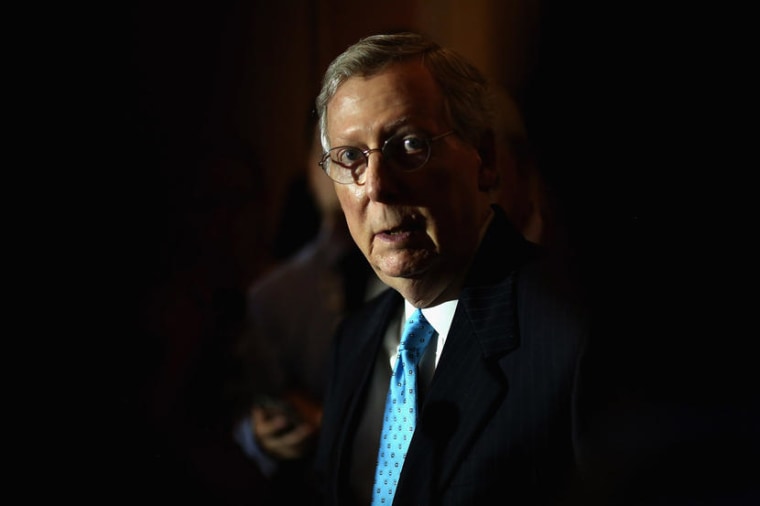Shortly before senators wrapped up their work and left town again, Senate Majority Leader Mitch McConnell (R-Ky.) thought it'd be a good idea to mock the Democratic-led House for its work schedule. From his floor remarks yesterday:
"While essential workers across the country continue to clock in, the Democratic House of Representatives has essentially put itself on paid leave for months. Since the early days of this crisis, the self-described 'People's House' has been suspiciously empty of... people. At this point, I'm wondering if we should send senators over there to collect their newspaper and water the plants. It's not just their physical absence. It's House Democrats' absence from any serious discussions at all."
As regular readers know, if there were a Hall of Fame for political hypocrisy, McConnell would be a first-ballot inductee. The Kentucky Republican has condemned obstructionism after mastering the fine art of obstructionism; he's stressed the virtues of bipartisanship after becoming the most partisan congressional leader in modern history; he's demanded that senators treat Supreme Court nominees fairly after spearheading an unprecedented blockage against a qualified, compromise Supreme Court nominee.
And now he's mocking the U.S. House for not doing enough real work, despite the U.S. Senate's lack of real work.
As we've discussed, in every Congress, the House majority leadership, regardless of which party is in control, sets aside the first 10 available bill numbers. It's intended as a symbolic way to signal a party's top legislative priorities: H.R. 1 through H.R. 10 will reflect the leadership's most important goals.
So far in this Congress, the House Democratic majority has passed its democracy-reform package (H.R. 1), the Lower Drug Costs Now Act (H.R. 3), the Voting Rights Advancement Act (H.R. 4), the Equality Act to expand civil rights to LGBTQ Americans (H.R. 5), the Dream and Promise Act (H.R. 6), the Paycheck Fairness Act to address pay disparities between men and women (H.R. 7), a bill to expand background checks on gun purchases (H.R. 8), and a bill to address the climate crisis (H.R. 9). House Dems have also passed bills to expand the Violence Against Women Act and expand the Dream Act for young immigrants.
Moreover, just last week, the House also passed an ambitious aid package -- the HEROES Act -- intended to address the economic crisis caused by the pandemic.
The GOP-led Senate, meanwhile, has barely tried to do any legislating at all. Sen. Chris Murphy (D-Conn.) complained a while back that McConnell has "effectively turned the United States Senate into a very expensive lunch club that occasionally votes on a judge or two." The same week, Politico ran a piece describing the upper chamber as a legislative "graveyard," adding that even some Senate Republicans have noticed the chamber's "standstill," and conceded it's "frustrating" how little work the chamber was doing.
There was a point last year in which the Senate literally went months without holding a roll call vote on passing any type of legislation.
Does McConnell really want to have a conversation about which chamber of Congress deserves plaudits for hard work?
The Republican leader's insistence that in the midst of the COVID-19 crisis, House Democrats have been absent from "serious discussions" was especially jarring. After all, when House Speaker Nancy Pelosi (D-Calif.) crafted the HEROES Act, she urged the GOP-led Senate to step up with an alternative and initiate substantive policy talks. McConnell balked -- and then left town.
What's more, for all of his posturing, the Senate majority leader has largely been relegated to bystander status since coronavirus legislating began in earnest in March.
If McConnell seriously wants the political world to have this discussion, he may not like where it ends up.

